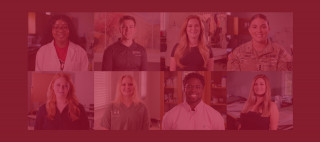Professor’s work bridges textiles and medicine

Vladimir Reukov is an assistant professor in the College of Family and Consumer Sciences, but he’s also a bridge builder. His work connects textiles research with biomedical applications, lab discoveries with industry, and students with hands-on experiences that launch rewarding careers.
“I’ve always been intrigued with taking my knowledge of chemistry and materials science and applying that to medicine,” said Reukov. “My passion is not just to do the experimental research in the lab; I want to bring it further, to conduct translational research that eventually brings it to the patients and the hospitals.”
Developing next-generation materials
Reukov’s research explores several areas in which the application of next-generation materials has the potential to promote healing, fight disease or even support the growth of new tissues.
He and his colleagues are exploring whether coating surgical mesh implants, such as those used to treat hernias, with the antioxidant vitamin E can reduce inflammation and promote healing.
Another project is examining how antioxidant nanoparticles can be encapsulated to deliver targeted tumor treatments. In a project funded by the National Science Foundation’s Innovation Corps program, he is exploring how three-dimensional cell culture scaffolds that he and his colleagues created can be applied to a range of applications—from the screening of drug candidates to tissue regeneration and the production of meat cultured from cells.
In addition to receiving funding and expertise through the university’s I-Corps program, he is building connections with researchers with similar interests at Georgia Tech, Emory, the Morehouse School of Medicine and other institutions through the Georgia Clinical and Translational Science Alliance’s TEAMS Program.
“The most important thing it provides me with is networking, since science cannot really exist in a vacuum,” Reukov said. “We need to cooperate and we need to compete at some point, but it all needs to be discussed so that we can know what is being done and how we can make things better.”
Educating the next generation of entrepreneurs
Reukov’s research is closely intertwined with his instruction, both in the College of Family and Consumer Sciences and in the university’s campus-wide Entrepreneurship Program.
His “Entrepreneurship in Medical Textiles and Devices” course, which incorporates lectures as well as hands-on projects, has drawn students majoring in fields as varied as business administration, consumer economics, fashion merchandising, electrical and electronics engineering, health promotion and computer science.
“The beauty of the class is that it is designed so that students can work on the specific skills they need,” Reukov said. “The fear of starting or beginning something is what I see in many of them, and we work on that so that by the end of the course they have new skills and also more confidence.”
Looking back on his time as an undergraduate student, Reukov says his most formative experiences were those in which he was able to conduct research under the mentorship of his professors. He currently has 22 students involved in 15 different projects in his lab. He has mentored more than 300 students over the course of his career and delights in learning about their successes.
One of his Entrepreneurship Program students recently parlayed his newfound web development skills into his first job after graduation, and it’s not uncommon for former students to write to him years later and credit their experiences in his lab with helping them land jobs in industry or positions in graduate or medical school.
Sometimes, he and his former students reconnect as colleagues. Through his I-Corps project, he conducted more than 100 interviews with potential industry partners, including a former student now working in the Netherlands to culture meats from cells. The field is growing rapidly due to demand for high-quality protein that minimizes environmental impact.
“We quickly realized that this scaffold niche is almost completely empty,” he said. “You can find artificial burgers now, but what if you want steak? Steak has a very complex, multi-layer, hierarchical structure of fibers where our 3D scaffolds can play a role. So now this is one of the areas that we’re working on.”
This article was written by Sam Fahmy, director of communications for Academic Affairs in the provost's office.
In this category: Innovation
-
Opportunity abounds for FACS design students
Interest in the furnishings and interiors program surges due partly to diverse career options it offers students.

-
Innovative lab leading research into next generation fabrics
UGA, industry partners team up in search of a more sustainable filter

-
We Are FACS campaign showcases college’s diverse career paths
Launched in June, the campaign raises awareness about the college's offerings

-
Dominating over junk food on social media
Study finds healthier foods can be made more appealing through a few simple steps

-
FACS grad takes home $25,000 prize in UGA Collegiate Great Brands Competition
UGA Entrepreneurship pitch contest draws 52 student startups for their chance at $25,000 prize
